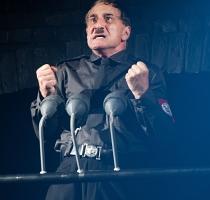The Resistible Rise of Arturo Ui Review
Described by its author, Bertolt Brecht, as a "history farce", this play was kept under wraps for almost two decades after it was written in 1941. It was to be two years after Brecht's death that his work was finally premièred in Germany. The play parodies the rise of Adolph Hitler in the Germany of the 1930s, though it is set, not in Germany as one might expect, but in Chicago in the United States. And as the title implies, Brecht's view seems to be that the rise of Hitler was preventable.
Arturo Ui is a Chicago gangster with green ambitions. In his sights is the trade in vegetables controlled by the 'Cauliflower Trust', a group of businessmen who control the supply of veg in the area. In the hard times after the Great Depression, the Trust decide to raise a loan from the city corporation on the pretext that the docks will be rebuilt. They use a politician called Dogsborough (William Gaunt) to act as intermediary in fixing the deal. But far from being the honest politician the public think he is, Dogsborough is rewarded by the Trust with shares in a shipping line and, later, a country house. When Ui discovers this, he finds a way in to take over the veg business, not only in Chicago, but later on in the neighbouring town of Cicero as well. To further his ends, Ui has people slaughtered at the drop of a hat, including some of his own henchmen when he suspects they have betrayed him. The plot closely parallels events in Hitler's Germany, and his takeover of Austria in 1938.
Henry Goodman takes on the formidable and hugely demanding role of Arturo Ui, and the result is an astonishing tour de force that is quite simply staggeringly good to watch. When we first meet Mr Goodman's Ui, we discover a small, insignificant man with slicked-back black hair who twitches and grimaces, and is almost continually in motion. Dressed in a creased suit with enlarged shoulder-pads and a black felt hat, Ui lives in fear, especially of the police. When he first appears on stage, he grimaces and gesticulates but says nothing. But when he does start to talk, his speech patterns are familiarly erratic - one moment he is talking quietly and calmly and then he suddenly bursts into a moody rage, before assuming his quieter persona just a suddenly. Though Ui repeatedly tells us that he is a 'simple son of Brooklyn' and a former painter, we quickly learn that he is also a master manipulator who has 'monumental plans' and little regard for his fellow humans - "the weak fall by the wayside - that's the law of nature", he tells us.
Mr Goodman is ably supported by a large and talented cast, many of whom play the instruments which provide a musical introduction to the show. There's great work from William Gaunt as Dogsborough, the man who 'knew it all and let it happen', Michael Feast as Uri's evil henchman Roma, Benny Young as the slick businessman Clarke, the 'cauliflower king', and Keith Baxter turns in a wonderfully-played performance as a has-been actor who gives Ui 'electrocution' lessons and tips on movement in a hilarious scene where we see Ui develop Hitler's trademark salute, staring gaze and genital-clasping stance. The play is exceptionally well-directed by Jonathan Church, with translation by George Tabori (revised for this production by Alistair Beaton).
There is a definite developmental shift in Ui's character in the second half. No longer the little comic figure who struggles to stop scaring himself, or worrying about being shot by the police, he's now a man who has his feet firmly under the commercial and political table, and has the formidable confidence to go with it. Ruling the vegetable roost in Chicago is now insufficient for Ui and so he spreads his wings to the neighbouring town of Cicero where he soon has "500 grocers at his feet". These references to the vegetable business are extremely funny as, of course, is the character of Ui, at least in the initial stages of the play. But if we were ever likely to forget that Hitler was a much more sinister and terrifying character in reality, the play's ending provides a timely, poignant and chilling reminder of the horrors this man and his associates perpetrated. That message is vitally important, and combined with a hugely memorable performance from Henry Goodman, fine storytelling and great comedy too it makes for an evening of riveting, unmissable theatre.
"Swaggeringly confident production, with Henry Goodman giving an electrifying performance in the title role, this is a show you really should see."
Charles Spencer for Daily Telegraph
"Henry Goodman is a knockout as Arturo U."
Lyn Gardner for The Guardian
"This accomplished production...has a golden ticket when it comes to its leading actor. Henry Goodman, who in the past has won much acclaim for roles with a markedly Jewish slant, now dazzles as a very loosely veiled Adolf Hitler. It's a hell of a role and Goodman gives a hell of a performance to match."
Fiona Mountford for The Evening Standard
"The role of Arturo Ui calls for bravura, high-definition acting and that's what it gets, in spades, from Henry Goodman in Jonathan Church's splendid production."
Paul Taylor for The Independent
External links to full reviews from popular press
Telegraph - Guardian - Independent -
Originally published on
